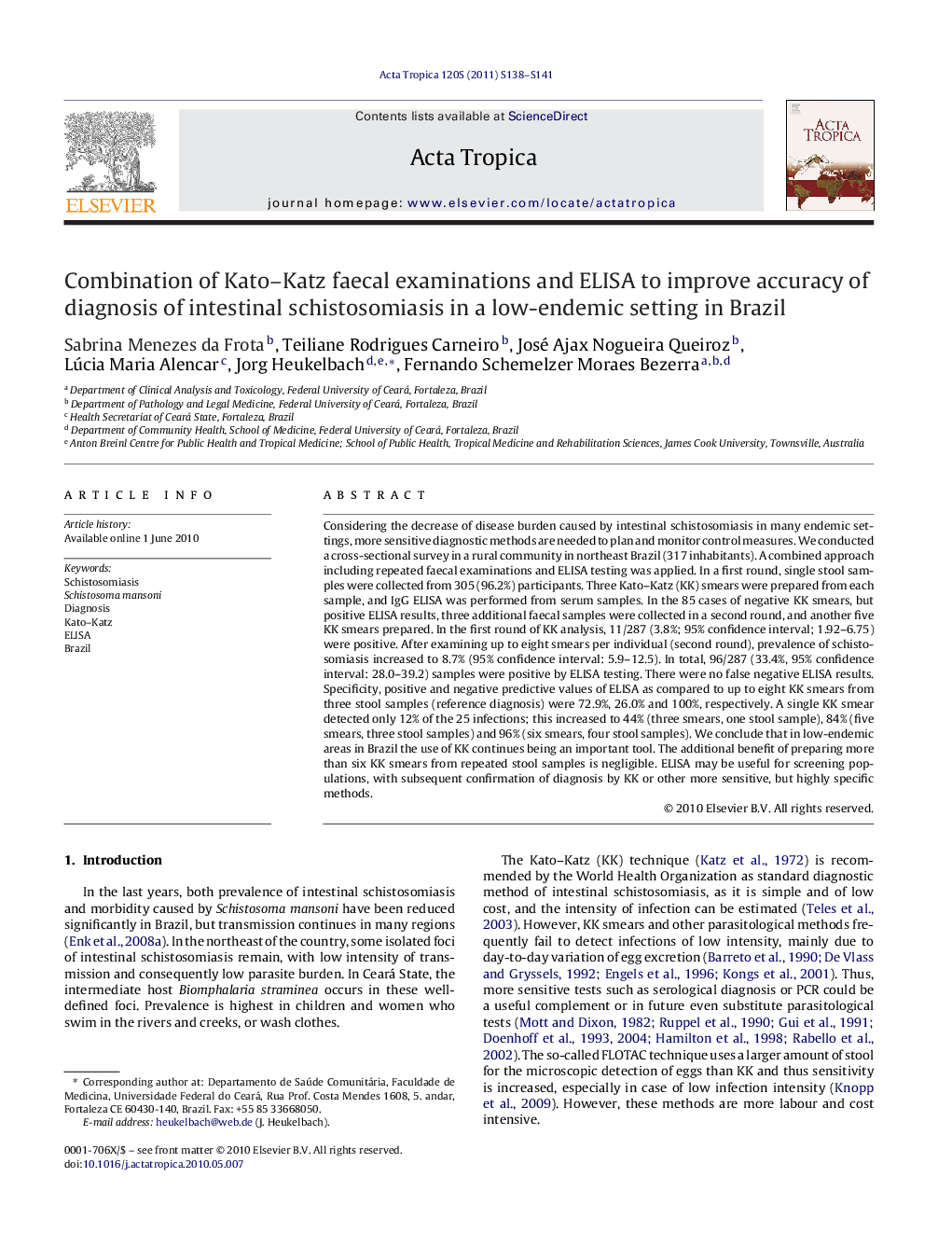| کد مقاله | کد نشریه | سال انتشار | مقاله انگلیسی | نسخه تمام متن |
|---|---|---|---|---|
| 6128193 | 1221430 | 2011 | 4 صفحه PDF | دانلود رایگان |
عنوان انگلیسی مقاله ISI
Combination of Kato-Katz faecal examinations and ELISA to improve accuracy of diagnosis of intestinal schistosomiasis in a low-endemic setting in Brazil
دانلود مقاله + سفارش ترجمه
دانلود مقاله ISI انگلیسی
رایگان برای ایرانیان
کلمات کلیدی
موضوعات مرتبط
علوم زیستی و بیوفناوری
ایمنی شناسی و میکروب شناسی
انگل شناسی
پیش نمایش صفحه اول مقاله

چکیده انگلیسی
Considering the decrease of disease burden caused by intestinal schistosomiasis in many endemic settings, more sensitive diagnostic methods are needed to plan and monitor control measures. We conducted a cross-sectional survey in a rural community in northeast Brazil (317 inhabitants). A combined approach including repeated faecal examinations and ELISA testing was applied. In a first round, single stool samples were collected from 305 (96.2%) participants. Three Kato-Katz (KK) smears were prepared from each sample, and IgG ELISA was performed from serum samples. In the 85 cases of negative KK smears, but positive ELISA results, three additional faecal samples were collected in a second round, and another five KK smears prepared. In the first round of KK analysis, 11/287 (3.8%; 95% confidence interval; 1.92-6.75) were positive. After examining up to eight smears per individual (second round), prevalence of schistosomiasis increased to 8.7% (95% confidence interval: 5.9-12.5). In total, 96/287 (33.4%, 95% confidence interval: 28.0-39.2) samples were positive by ELISA testing. There were no false negative ELISA results. Specificity, positive and negative predictive values of ELISA as compared to up to eight KK smears from three stool samples (reference diagnosis) were 72.9%, 26.0% and 100%, respectively. A single KK smear detected only 12% of the 25 infections; this increased to 44% (three smears, one stool sample), 84% (five smears, three stool samples) and 96% (six smears, four stool samples). We conclude that in low-endemic areas in Brazil the use of KK continues being an important tool. The additional benefit of preparing more than six KK smears from repeated stool samples is negligible. ELISA may be useful for screening populations, with subsequent confirmation of diagnosis by KK or other more sensitive, but highly specific methods.
ناشر
Database: Elsevier - ScienceDirect (ساینس دایرکت)
Journal: Acta Tropica - Volume 120, Supplement 1, September 2011, Pages S138-S141
Journal: Acta Tropica - Volume 120, Supplement 1, September 2011, Pages S138-S141
نویسندگان
Sabrina Menezes da Frota, Teiliane Rodrigues Carneiro, José Ajax Nogueira Queiroz, Lúcia Maria Alencar, Jorg Heukelbach, Fernando Schemelzer Moraes Bezerra,